Apps
Auto Added by WPeMatico
Auto Added by WPeMatico
With the days of desert-themed releases officially behind it, Google today announced the first developer preview of Android 11, which is now available as system images for Google’s own Pixel devices, starting with the Pixel 2.
As of now, there is no way to install the updates over the air. That’s usually something the company makes available at a later stage. These first releases aren’t meant for regular users anyway. Instead, they are a way for developers to test their applications and get a head start on making use of the latest features in the operating system.
“With Android 11 we’re keeping our focus on helping users take advantage of the latest innovations, while continuing to keep privacy and security a top priority,” writes Google VP of Engineering Dave Burke. “We’ve added multiple new features to help users manage access to sensitive data and files, and we’ve hardened critical areas of the platform to keep the OS resilient and secure. For developers, Android 11 has a ton of new capabilities for your apps, like enhancements for foldables and 5G, call-screening APIs, new media and camera capabilities, machine learning, and more.”
 Unlike some of Google’s previous early previews, this first version of Android 11 does actually bring quite a few new features to the table. As Burke noted, there are some obligatory 5G features like a new bandwidth estimate API, for example, as well as a new API that checks whether a connection is unmetered so apps can play higher-resolution video, for example.
Unlike some of Google’s previous early previews, this first version of Android 11 does actually bring quite a few new features to the table. As Burke noted, there are some obligatory 5G features like a new bandwidth estimate API, for example, as well as a new API that checks whether a connection is unmetered so apps can play higher-resolution video, for example.
With Android 11, Google is also expanding its Project Mainline lineup of updatable modules from 10 to 22. With this, Google is able to update critical parts of the operating system without having to rely on the device manufacturers to release a full OS update. Users simply install these updates through the Google Play infrastructure.
Users will be happy to see that Android 11 will feature native support for waterfall screens that cover a device’s edges, using a new API that helps developers manage interactions near those edges.
Also new are some features that developers can use to handle conversational experiences, including a dedicated conversation section in the notification shade, as well as a new chat bubbles API and the ability to insert images into replies you want to send from the notifications pane.
Unsurprisingly, Google is adding a number of new privacy and security features to Android 11, too. These include one-time permissions for sensitive types of data, as well as updates to how the OS handles data on external storage, which it first previewed last year.
As for security, Google is expanding its support for biometrics and adding different levels of granularity (strong, weak and device credential), in addition to the usual hardening of the platform you would expect from a new release.
There are plenty of other smaller updates as well, including some that are specifically meant to make running machine learning applications easier, but Google specifically highlights the fact that Android 11 will also bring a couple of new features to the OS that will help IT manage corporate devices with enhanced work profiles.
This first developer preview of Android 11 is launching about a month earlier than previous releases, so Google is giving itself a bit more time to get the OS ready for a wider launch. Currently, the release schedule calls for monthly developer preview releases until April, followed by three betas and a final release in Q3 2020.
Powered by WPeMatico
Is “Twitter Stories” on the way? Or will we just get tools to send prettier tweets? Well now Twitter has the talent for both as it’s just acquired Chroma Labs. Co-founded by Instagram Boomerang inventor John Barnett, Chroma Labs’ Chroma Stories app let you fill in stylish layout templates and frames for posting collages and more to Instagram Stories, Snapchat, and more.
Rather than keeping Chroma Stories around, Twitter will be splitting the Chroma Labs squad up to work on its product, design and engineering teams. The Chroma Stories iPhone app won’t be shut down, but it won’t get more updates and will only work until there’s some breaking change to iOS.
Thrilled to welcome the amazing @Chroma_Labs team including @picturejohn, @alexli, @joshuacharris to @Twitter.
They’ll join our product, design, and eng teams working to give people more creative ways to express themselves on Twitter
— Kayvon Beykpour (@kayvz) February 18, 2020
“When we founded Chroma Labs in 2018, we set out to build a company to inspire creativity and help people tell their visual stories. During the past year, we’ve enabled creators and businesses around the world to create millions of stories with the Chroma Stories app” the Chroma Labs team writes on its site. “We’re proud of this work, and look forward to continuing our mission at a larger scale – with one of the most important services in the world.”
We’ve reached out to Twitter for more details on the deal and any price paid. [Update: Twitter confirms this is an acquisition, not just and acquihire of the team as it first appeared, though Chroma Stories is shutting down. It refused to disclose the terms of the acquisition, but said all seven employees of Chroma Labs are coming aboard. The team will be working on the Conversations division at Twitter, and the deal is meant to boost its talent, leadership, and expertise for serving public discussions. A Twitter spokesperson also confirms that Chroma will shut down its .business and future versions of the app will not be available.]
Founded in late 2018, Chroma Labs had raised a seed round in early 2019 and counted Sweet Capital, Index Ventures, and Combine VC as investors. Barnett’s fellow co-founders include CTO Alex Li, who was an engineering manager on Facebook Photos and Instagram Stories; and Joshua Harris was a product design manager on the Oculus Rift and Facebook’s augmented reality filters.

With Chroma Stories, you could choose between retro filters, holiday themed frames, and snazzy collage templates to make your Storie look special amidst the millions posted each day. Sensor Tower estimates Chroma Stories had 37,000 downloads to date. That tepid reception despite the app’s quality might explain why the team is joining Twitter.
By snatching up some of the smartest talent in visual storytelling, Twitter could give its text-focused app some spice. It’s one of the few social apps without a Stories product already, and its creative tools are quite limited. Better ways to lay out photos in tweets could make Twitter more beautiful and less exhausting to sift through. That might make it more appealing to teens and help it boost its user count, which now lags behind Snapchat.
Twitter has become the world’s public record for words. The Chroma Labs talent might make it the real-time gallery for art and design as well.
[Update 3:05pm Pacific: Twitter confirms that this is a full acquisition of the Chroma Labs company, not just an acquisition as we originally printed.]
Powered by WPeMatico
“I don’t feel good about that. That sucks,” Chrys Bader-Wechseler reflects when asked about the bullying that went down on the anonymous app Secret he co-founded in 2013. After $35 million raised, 15 million users and a spectacular flame out two years later, the startup was dead. “Since I left Secret I feel alive and aligned with my values and my purpose again.”
But there was one bright side to Secret letting you post without a name or consequences. People opened up, got vulnerable and felt less alone when comments revealed they weren’t the only person dealing with a certain struggle. What Bader learned from watching Secret’s users “do this in the dark” was the realization that “actually, we need to learn to do this in the light, to have that same kind of dialogue, but do it openly with each other.”
So began the journey to Bader’s new startup Ikaria that’s exclusively revealing itself to the world today on TechCrunch. It’s a different kind of chat app, named after the Greek island where a close-knit community helps extend people’s lifespans. The six-person Santa Monica team is funded by a $1.5 million seed round led by Initialized Capital and Fuel Capital. People can sign up for early beta access here.

During a long interview about the startup, Bader and his co-founder Sean Dadashi were cagey about exactly how Ikaria works, as it’s still in development. Amidst all the philosophical context about the app’s intention, I was able to pull out a few details about what the product will actually look like.
“Basically, since 2004, technology has created this monumental shift in the human social experience. We’re more connected than ever technically but all the studies show we’re lonelier than ever,” Bader explains. “It’s like eating McDonald’s to get healthy. It’s not the right source of nutrition for our social well-being because true connection requires a level of vulnerability, presence, self-disclosure and reciprocity that you don’t really get on these platforms.”
Ikaria isn’t another feed. It’s a safe space where you can chat with close friends and family, or people going through similar life challenges. Members of these group chats will optionally go through guided experiences that help them reflect on and discuss what’s going on in their hearts and minds. This could become a whole new media format where outside creators or mental health professionals could produce and contribute their own guided experiences.
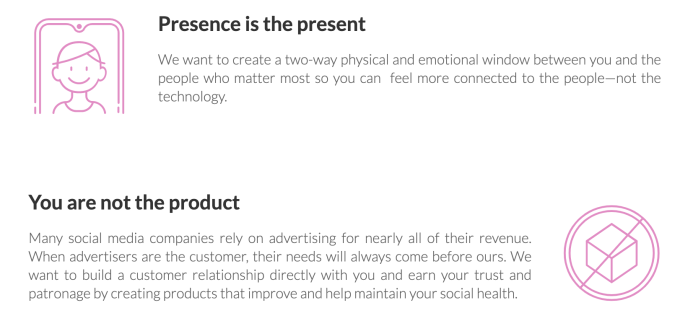
“Part of the reason we’re announcing this is that . . . it’s a call to action to involve all these practitioners and people who are doing these types of things and giving them a platform to allow them to facilitate these kind of group bonding experiences through a platform where they can extend their practices into the digital world,” Bader tells me. What Calm and Headspace did for making meditation more mainstream and accessible, Ikaria wants to do for mental health through online togetherness.
Ikaria already has a sizable closed beta going, which the startup plans to continue until it finds product fit, and it hopes to know its official release timeline by the end of the year. “We’re not going to launch this until we know 40% of people would be disappointed if they couldn’t use it.”
Rather than monetizing by exploiting people’s attention, Ikaria plans to develop a “customer relationship” with users, which could mean subscription access or in-app payments for buying content. Perhaps one user could act as the sponsor and purchase an experience for their whole group chat. Until then, it’s got its seed funding from Initialized, Fuel Capital, F7 Ventures, Ryan Hoover’s Weekend Fund, Backend Capital, Day One Ventures, Shrug, Todd Goldberg and Superhuman’s Rahul Vohra.
“The hope is that eventually this would be an app you use instead of iMessage, to increase your sense of presence,” Bader explains, revealing its grand ambitions. Why would we need to replace our core chat apps? Well for one thing, they don’t understand who really matters to you. If an app understood who your mom is, it could give her messages special prevalence or remind you to contact her.

Bader met Dadashi through an offline men’s group for discussing life, love and everything in the wake of Secret’s collapse and a rough romantic breakup. After just a few weeks of these meetups, they say they felt closer to each other than to most of their friends. Only later did Bader, a designer by trade, discover that Dadashi was a coder who’d been CTO of electronics company MHD Enterprises before starting a travel and lifestyle startup for mental wellness, called Somatic Studios. They tried working together on an app for sharing quotes from your friends but scrapped it.
Together, the pair went on to research the rapid rise of other vulnerability-focused meetup organizations like the one where they met, including Evryman, ManKind Project, Quilt, Authentic Relating, Circling, and T-Groups. Though they knew that to have a chance at impact at scale, they’d need to build a mobile app familiar enough to get people over the hurdle of starting a mindfulness practice. They laid out a few principles to build by: a focus on relationships instead of Likes and followers, conscious design that won’t exploit people’s attention or weaknesses, no ads, and keeping all data private and in control of the user.
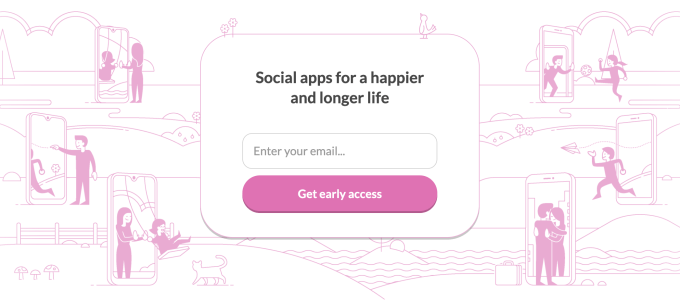
There are other startups hoping to address the sad state of mental health from different angles. Talkspace offers a mobile connection to licensed therapists, though it can be pricey at $65 to $99 per week. 7 Cups and TalkLife makes peer-to-peer counseling from volunteers free, though these aren’t professionals. There are also plenty of journaling products, gratitude practice apps and wellness podcasts out there. But Ikaria’s approach, combining mental health content with group chats of people you trust, feels unique.
Having known Bader since the Secret days, it’s obvious that working with Dadashi has made him happier and more centered. Ikaria is an app he can wake up feeling good about each day. “You know, I don’t like to speak ill of David [Byttow, Secret’s CEO who sources say was verbally abusive to employees], but that relationship was very, very toxic and taxing for me. And this time around with Sean, as I’m sure you can tell, is the polar opposite.”
If Ikaria can help people develop the open and honest relationships with friends or peers like building it has done for Bader and Dadashi, it could be a beacon amidst a sea of time unwell spent.
Powered by WPeMatico
Spotify’s ongoing investments in the podcast-streaming side of its business helped boost podcast listening on its service by 200% last year. But today, only 16% of Spotify’s monthly listeners are engaging with podcasts — a number the company today hopes to nudge higher by redesigning the podcast side of its streaming app. The new layout now makes it easier to view information about podcasts and improves discovery of new shows.
In particular, Spotify has given podcast show trailers a more prominent position in its app.
Show trailers help podcasts find new listeners by offering a concise introduction to the podcast and its creators. A good trailer hooks listeners on the show’s concept by selling its strengths, or even by offering a snippet of content that makes listeners hungry to hear more.
In the updated version of Spotify’s app, these trailers are labeled “trailer” and are highlighted at the top of the episode list, separated from the content as Apple does in its own podcasts app.
The belief here is that listeners need an easier way to check out the different podcasts out there, without having to commit to full episodes. That’s more important than ever as Spotify’s podcast library expands. The app’s catalog now has more than 700,000 podcasts across all sorts of topics — a figure that’s growing quickly. In January, Spotify was at the Consumer Electronics Show touting its “over 500,000” podcasts. By the time of this month’s earnings, it was using the higher number.
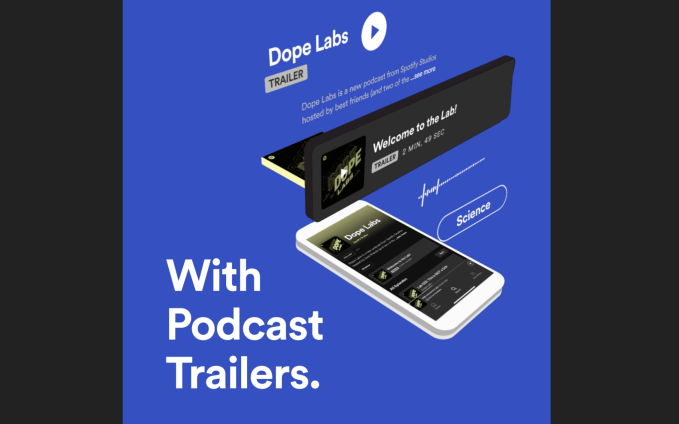
Also to aid in discovery, Spotify is adding descriptive show categories underneath the show’s description. These will be simple labels, like “true crime,” “personal stories,” “travel,” “relationships” and more. This change is also focused on catching up with market leader Apple Podcasts, which already categorizes its podcasts in a similar way.
The other major change is to the landing page for podcast shows in Spotify, which are getting a revamp to be more readable at a glance.
The updated layout has moved the descriptions up to the top of the page, so you don’t have to swipe on a show to read about it. Before, Spotify would display the podcast’s thumbnail image at the top, and you’d swipe left to view the description. Now, the layout looks more like — yes, you guessed it — Apple Podcasts.
The combined changes do make Spotify’s app more usable for podcast listening and discovery — especially for people who are used to Apple Podcasts’ design and layout but are now making the jump to Spotify. However, Spotify’s real advantage in podcasts isn’t just how it can mimic Apple’s better design, but how it’s catering to creators, investing in originals and exclusives, personalizing its recommendations and, now, its ads.
Spotify says the redesign is rolling out to its mobile app starting today.
Powered by WPeMatico
Facebook may make it easier to escape its ranking algorithm and explore the News Feed in different formats. Facebook has internally prototyped a tabbed version of the News Feed for mobile that includes the standard Most Relevant feed, the existing Most Recent feed of reverse chronological posts that was previously buried as a sidebar bookmark and an Already Seen feed of posts you’ve previously viewed that historically was only available on desktop via the largely unknown URL facebook.com/seen.
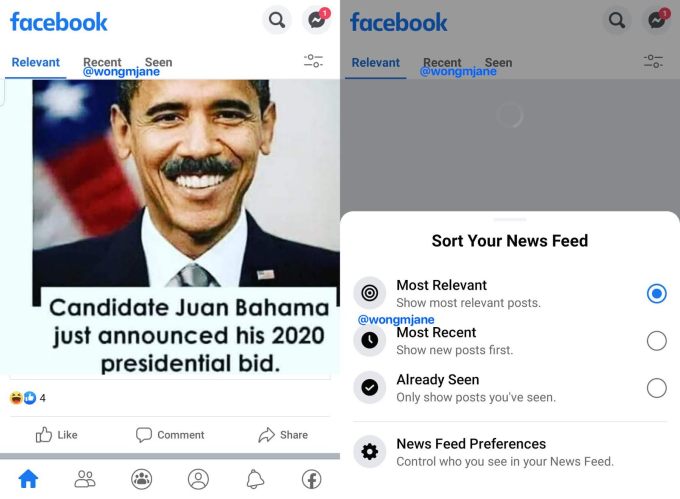
The tabbed feed is currently unlaunched, but if Facebook officially rolls it out, it could make the social network feel more dynamic and alive as it’d be easier to access Most Recent to view what’s happening in real time. It also could help users track down an important post they lost that they might want to learn from or comment on. The tabbed interface would be the biggest change to News Feed since 2013 when Facebook announced but later scrapped the launch of a multi-feed with side bar options for just exploring Music, Photos, Close Friends and more.
The tabbed News Feed prototype was spotted in the Facebook for Android code by master reverse engineering specialist Jane Manchun Wong, who has provided to TechCrunch tips on core new features. She was able to generate these screenshots that show the tabs for Relevant, Recent and Seen above the News Feed. Tapping these reveals a Sort Your News Feed configuration window where you can choose between the feeds, see descriptions from them or dive into the existing News Feed preferences about who you block or see first.
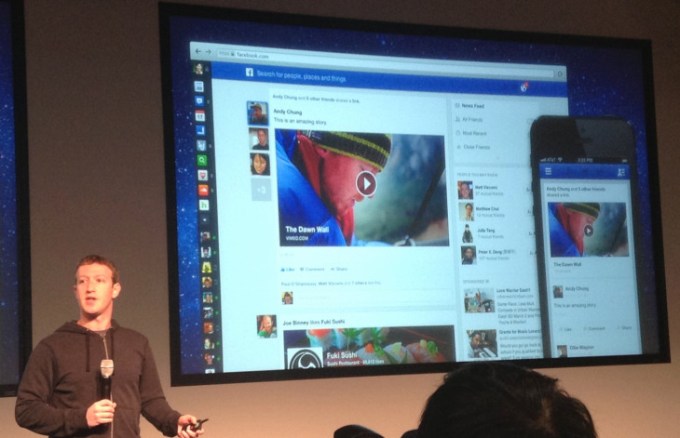
CEO Mark Zuckerberg reveals the later-scrapped multi-feed
When asked by TechCrunch, a Facebook spokesperson confirmed this is something it’s considering testing externally, but it’s just internally available for now. It’s exploring whether the tabbed interface would make Most Recent and Seen easier to access. “You can already view your Facebook News Feed chronologically. We’re testing ways to make it easier to find, as well as sort by posts you’ve already seen,” the spokesperson tells TechCrunch, and the company also tweeted.
Offering quicker ways to sort the feed could keep users scrolling longer. If they encounter a few boring posts chosen by the algorithm, want to see what friends are doing right now or want to enjoy posts they already interacted with, a tabbed interface would give them an instant alternative beyond closing the app. While likely not the motive for this experiment, increasing time spent across these feeds could boost Facebook’s ad views at a time when it has been hammered by Wall Street for slowing profit growth.
To many, Facebook’s algorithm can feel like an inscrutable black box that decides their content destiny. Feed it the wrong signals with pity Likes or guilty-pleasure video views and it can get confused about what you want. Facebook may finally deem us mature enough to have readily available controls over what we see.
Powered by WPeMatico
Voodoo Games is one of the most interesting startups alive today. In mid-2018, it had 150 million MAUs and raised $200 million from Goldman Sachs, yet I’ve never heard anyone mention the company. That might be normal for an obscure enterprise SaaS play, but Voodoo is consumer-facing through and through.
Quantitative success aside, Voodoo upends much of the conventional thinking about product design and gaming. If it can do it, how can similar strategies apply to other products?
Voodoo is best described as a product conglomerate. Take a look at its App Store page. It has dozens of generic-looking apps. The basic playbook is:
Powered by WPeMatico
Welcome back to This Week in Apps, the Extra Crunch series that recaps the latest OS news, the applications they support and the money that flows through it all.
The app industry is as hot as ever, with a record 204 billion downloads in 2019 and $120 billion in consumer spending in 2019, according to App Annie’s recently released “State of Mobile” annual report. People are now spending 3 hours and 40 minutes per day using apps, rivaling TV. Apps aren’t just a way to pass idle hours — they’re a big business. In 2019, mobile-first companies had a combined $544 billion valuation, 6.5x higher than those without a mobile focus.
In this Extra Crunch series, we help you keep up with the latest news from the world of apps, delivered on a weekly basis.
This week, we look at YouTube TV’s decision to stop revenue-sharing with Apple, another mobile voting app with serious flaws, new Apple launches in coding and AR, Microsoft’s game-streaming service Project xCloud arrival on iOS and other notable app news and trends, including WhatsApp’s big 2 billion user milestone, and more.
This week, YouTube emailed customers subscribed to its YouTube TV service by way of Apple’s in-app purchases to let them know that this subscription offering will be discontinued starting on March 13, 2020. Current subscribers will have their subscription canceled automatically on their billing date after March 13, the letter said.
This is a pretty severe way for Google to end its subscription revenue-sharing with Apple, however. Most companies that decide to shut off in-app subscriptions still continue to honor those from existing subscribers — they just stop selling to new customers. In YouTube TV’s case, it’s actually ending its relationship with all its customers on Apple devices with the hope they’ll return and resubscribe. That’s quite a risk, given that YouTube TV is not the only streaming TV service out there, and customers getting their subscription canceled may take this opportunity to shop around. The timing is also poorly thought-out, given that YouTube TV just picked up new subs following Sony’s PlayStation Vue shutdown — and now it’s kicking them out.
The move makes Google the latest company to rebel against Apple’s 30% cut of all in-app payments (which drops to 15% in year two). A growing number of app publishers are refusing to share a cut of their revenue with Apple — even saying that Apple’s decision to charge this fee is anti-competitive. For example, Spotify believes Apple’s fee makes it more difficult to compete with Apple’s built-in music service, and has raised the issue repeatedly to regulators. Netflix also stopped paying the “Apple tax” over a year ago.
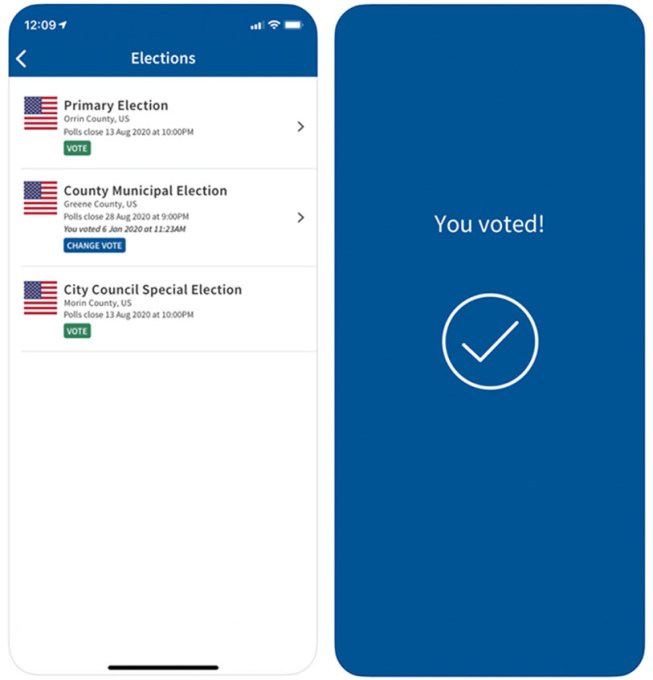
Above: Voatz, via The NYT
Last week, we looked at how a smartphone app meant to tabulate votes from the caucuses really screwed things up in Iowa. This week, MIT researchers took a look at mobile voting app Voatz, which has been used to tally votes for federal elections in parts of West Virginia, Oregon, Utah and Washington as part of various mobile voting pilot programs. The researchers found the app was riddled with security flaws that would let attackers monitor votes or even change ballots or block them without users’ knowledge. Attackers could also create a tainted paper trail, making a reliable audit impossible — despite Voatz’s promise of using blockchain technology to increase security. One security expert, speaking to VICE, called the app “sloppy” and filled with “elementary” mistakes.
Coming on the heels of the Iowa caucus mobile voting disaster, this latest news delivers another huge blow to the promise of mobile voting in the U.S.
Powered by WPeMatico
“Not gonna lie. This f*cking sucks. This is the last HQ ever!” yelled host Matt Richards . And it just got crazier from there.The farewell game of HQ Trivia before it shut down last night was a beautiful disaster. The hosts cursed, sprayed champagne, threatened to defecate on the homes of trolls in the chat window, and begged for new jobs. Imagine Jeopardy but Trebek is hyped-up and blacked-out.
Yesterday HQ Trivia ran out of money, laid off its 25 employees, and shut down. It was in talks to be acquired, but the buyer pulled out last minute and investors weren’t willing to pour any money into the sagging game show. It had paid out $6 million in prizes from its $15 million-plus in venture capital since launching in late 2017.
But HQ was in steady decline since February 2018 when it peaked at over 2.3 million concurrent players to just tens of thousands recently. The games grew repetitive, prize money was split between too many winners, co-founder Colin Kroll passed away, original host and quiz daddy Scott Rogowsky was let go, the startup’s staff failed in an attempt to mutiny and oust the CEO, and layoffs ensued. You can read how it all went down here.
But rather than wither away, the momentary cultural phenemenon went out with a bang. “Should HQ trivia shut down? No? Yes? Or f*ck no!” Richards cackled.
You can watch the final show here, and we’ve laid out some of Richards’ and co-host Anna Roisman’s choicest quotes from HQ’s last game:
 “Who likes healthy snacks! That’s why the investors stopped giving us money, because there wasn’t any f*cking snacks in this b*tch. We were snackless. Who the fuck can work in a place without snacks!” -Richards
“Who likes healthy snacks! That’s why the investors stopped giving us money, because there wasn’t any f*cking snacks in this b*tch. We were snackless. Who the fuck can work in a place without snacks!” -RichardsThen things really went off the rails at 41 minutes in, cued up here:
Farewell, HQ Trivia, you glorious beast.
Powered by WPeMatico
HQ Trivia is dead. Today the company laid off its full staff of 25 and will cease operation of its trivia, sports and word guessing games, a source close to the company confirmed.
HQ Trivia had a deal in the works to be acquired, but the buyer pulled out yesterday and investors aren’t willing to fund it any longer, CEO and co-founder Rus Yusupov said in a statement attained by CNN Business’ Kerry Flynn:
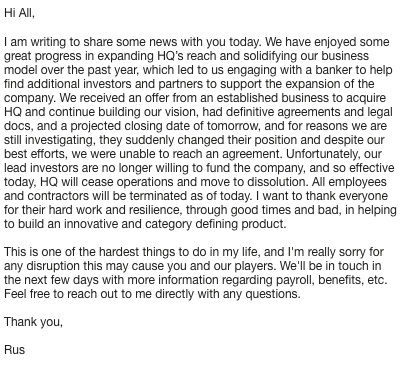
“We received an offer from an established business to acquire HQ and continue building our vision, had definitive agreements and legal docs, and a projected closing date of tomorrow, and for reasons we are still investigating, they suddenly changed their position and despite our best efforts, we were unable to reach an agreement,” Yusupov writes. “Unfortunately, our lead investors are no longer willing to fund the company, and so effective today, HQ will cease operations and move to dissolution. All employees and contractors will be terminated as of today.”
With HQ we showed the world the future of TV. We didn’t get to where we hoped but we did stretch the world’s imagination for what’s possible on our smartphones. Thanks to everyone who helped build this and thanks for playing.
— Rus (@rus) February 14, 2020
Launched in October 2017, TechCrunch wrote the first coverage of the 12-question live video trivia game started by two of the former Vine founders. Users could win real money by answering all the questions and not being eliminated in multiple daily games. HQ Trivia had raised more than $15 million, including a Series A led by Founders Fund. At one point it had more than 2.3 million concurrent players.
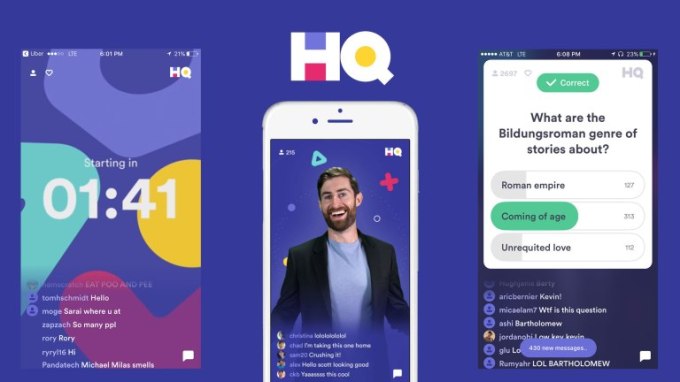
But eventually the novelty began to wear off. Cheaters came in, splitting the prize money down to just a few dollars or cents per winner. Copycats emerged internationally. Engineering issues led users to get kicked out of the game.
Then tragedy struck. Co-founder Colin Kroll passed away. That exacerbated internal problems at HQ Trivia. Product development was slow, leading users to grow tired of the game. New game types and viral features materialized too late.
A failed internal mutiny saw staffers prepare to petition the board to remove Yusupov from the CEO position. When he caught wind of the plot, organizers of the revolt were fired. Morale sunk. By July 2019, downloads were just 8% of their previous year’s, and 20% of the staff was laid off. HQ managed about 15 million all-time installs, peaking at 2 million in February 2018, while last month it had just 67,000, according to Sensor Tower.
The demise of HQ Trivia demonstrates the fickle nature of the gaming industry, and the startup scene as a whole. Momentary traction is no guarantee of future success. Products must continually evolve and adapt to their audience to stay relevant. And executives must forge ahead while communicating clearly with their teams, even amongst uncertainty, or find their companies withered by the rapid passing of time.
Powered by WPeMatico
Want to spice up the bedroom without paying for pills or awkward visits to a sex therapist? A new app called Lover lets you take a sexual personality quiz, explore carnal knowledge tutorials and discretely figure out which turn-ons you share with your partner. Built by board-certified sexual medicine clinical psychologist Dr. Britney Blair, Lover launches today on iOS with $5 million in seed funding from Tinder founder Sean Rad and other investors.
“It is strange that there are such taboos around sex when it is something we all do…whether we enjoy ourselves or not. We think it is time to start the conversation around this important aspect of our health,” says Dr. Blair. “We believe Lover can help build confidence, facilitate communication, improve partner connection and just raise consciousness about sex and sexuality.”
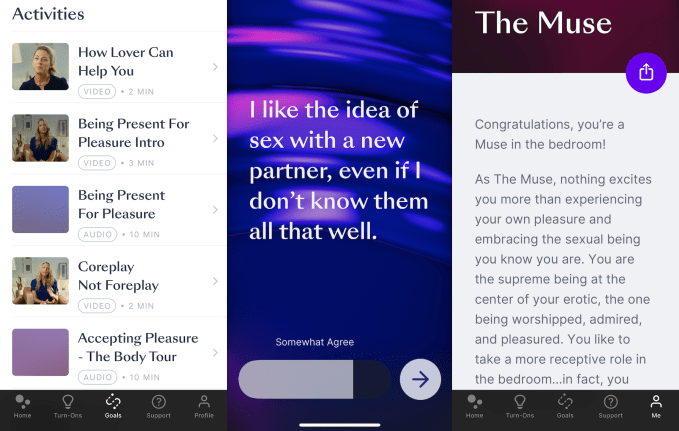
A solid portion of Lover’s content is free for the first seven days, including audio guides to oral sex, video explainers on how to be generous in bed and multi-step “playlists” of content like “Getting Hard, Made Easy.” Lover charges $9.99 per month or $59.99 per year for continued access to themed educational materials like “Coreplay Not Foreplay” and “Fantasy To Reality” that are recommended based on the results of your sexual questionnaire.
“Almost 50% of women and 40% of men have a sexual complaint . . . [but] most people don’t realize how common and treatable their issues are,” Dr. Blair tells me. “In our [pre-launch tests] focused purely on erectile dysfunction, 62% of users reported improvements to their erections within three weeks of using the app. That’s pretty wild when you think Viagra’s efficacy rate is approximately 65% and it lasts only five hours.”
Startups like digital pharmacy Ro have scored $500 million valuations just 18 months after launch by prescribing and selling men’s health drugs like Viagra. Lover sees a market for education-based alternative approaches to sexual wellness.
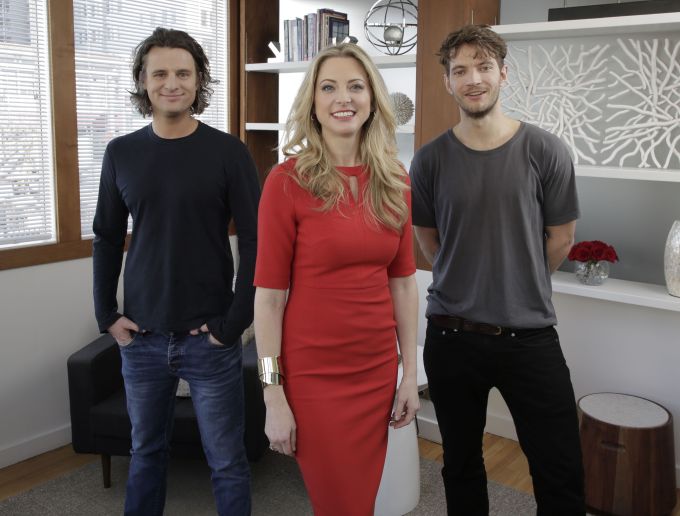
Lover co-founders (from left): Jas Bagniewski, Dr. Britney Blair and Nick Pendle
Dr. Blair got interested in the space a decade ago after a Stanford grad school lecture illuminated how prevalent sexual problems are but how quickly they can be resolved with learning and communication. She teamed up with her CEO Jas Bagniewski, who’d been the manager of Europe’s largest e-commerce business, Zalando in the U.K., and a founder of City Deal that sold to Groupon. Bagniewski and fellow Lover co-founder Nick Pendle started European Casper mattress competitor Eve Sleep and brought it to IPO.
The plan is to combine Dr. Blair’s educational materials with Bagniewski and Pendle’s e-commerce chops to monetize Lover through subscriptions and eventually recommending products like sex toys for purchase. Now they have $5 million in seed funding led by Lerer Hippeau, and joined by Manta Ray Ventures, Oliver Samwer’s Global Founders Capital, Fabrice Grinda and Jose Marin. The cash will go toward building out an Android app and adding games that partners can play together in bed.
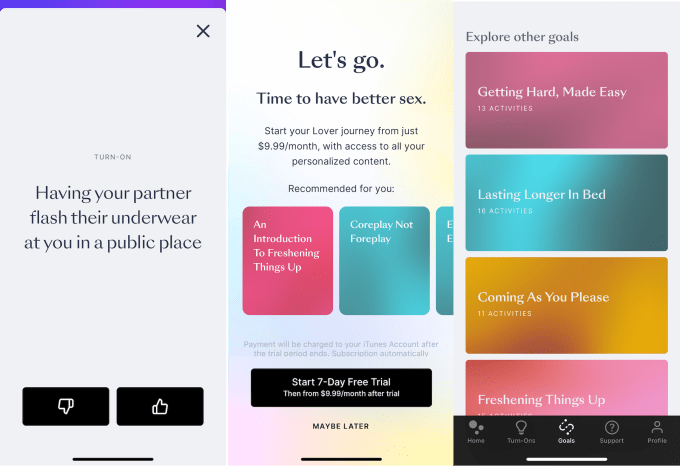
There are plenty of random sex tip websites out there. Lover tries to differentiate itself by personalizing content based on the results of a Myers-Briggs-esque quiz. This asks you how adventurous, communicative and assertive you are. You then receive a classification like “The Muse” with a few pages of explanation, for example, revealing how you like to inspire others while being the center of attention.
From there, Lover can suggest guides for mastering your own sexual personality or branching out into new behavior patterns. There’s also a feature copied from another app called XConfessions for figuring out what you and your partner like. You connect your apps and then separately swipe yes or no on questions about whether you’d like “having your partner drip candle wax on you” or “your partner dressing as a strict cop.” If you and they match, the app tells you both so you can try it out.
Overall, Lover’s content is a lot higher quality and more compassionate than where most people learn about sex: pornography. Having a real sexual medicine doctor overseeing the app lends credibility to Lover. And the design and tone throughout make you feel empowered rather than sleazy.
Still, Dr. Blair admits that “it’s hard to motivate people into behavioral change, people already have subscription apps on their phones and we may run into ‘subscription fatigue.’ ” People might feel natural paying for Viagra because the impact is obvious. The value of a subscription to sex tips might seem too vague or redundant to what’s free online.
To get a lot of users opening their wallets, not just their pants, Lover will need to do a better job of previewing what’s behind the paywall, and offering more interactivity that online content lacks. But if it can give users one unforgettable night thanks to its advice, it may be able to seduce them for the long-run.
Powered by WPeMatico